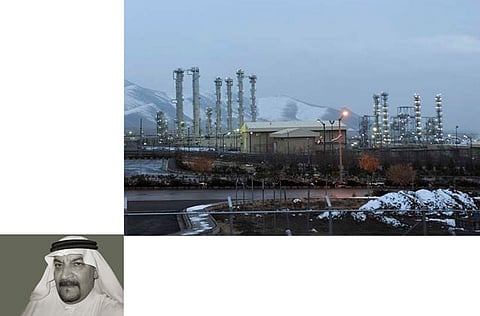Pre-emptive strike poses great danger
Not a person living anywhere in the Gulf region would be safe from exposure in the event Iran’s nuclear facilities are bombed

It’s no secret that Israel has been trying to enlist the United States by proxy to join in on in its aggressive stance towards Iran. And it is indeed not helpful that Iran has not been entirely forthcoming about its nuclear plans. Neither has Israel for that matter, but that point is rarely brought up on the international stage for reasons that escape me.
There are also those living in the Gulf who have been lulled into a false sense of invincibility against the elements when it comes to the blowing up of the environment. They believe they would remain unscathed from such an attack in their backyards, one that would undoubtedly discharge dangerous elements into the atmosphere that once released would be difficult to control.
A pre-emptive strike against Iran’s nuclear facilities poses great dangers not just to the Iranian nuclear machinery but to the whole region. This was a critical assessment by Wade Stone who argued that prevailing climatic conditions would help the nuclear fallout from such a strike to eventually move over to encompass the entire Gulf region.
As he explains it, “every spring and summer, during a period of low pressure over the Gulf, powerful winds known as the shamals and sharqi, sweep down from the north and north east into Saudi Arabia, whipping up ever more grains of sand as they head south and south west across the Arabian Desert. Frequently, these sandstorms become gargantuan in size; hundreds of metres high and kilometres wide and in length of dense roiling particulate, choking the lungs of those exposed, blocking out the sun completely and, by the time they are over, burying whole towns...”
He contends through careful analysis that these winds ‘generally take a semi-circular route, heading back out to the southern Gulf and the remaining Gulf states. Indeed, on an annual basis all of the Gulf states combined, the UAE, Qatar, Bahrain, Oman, Kuwait and Saudi Arabia, suffer through literally hundreds of such sand and dust storms.
And since such winds originate from Iran and elsewhere on its downwards spiral, in the event that Iran’s nuclear sites were to be bombed, the nuclear fallout from such an event would be extreme. “Millions would die within a decade or two of some form of radiation-induced cancer. And since a significant portion of that nuclear fallout would end up either immediately or over the course of the next weeks and months in the Arabian Desert, where the winds, year after year, would gather it up along with the particles of sand and dust into gigantic roiling irradiated storms (remember, hundreds of such sand and dust storms annually), not a person living anywhere in the Gulf region would be safe from exposure. The Gulf, too, would soon be so irradiated and toxic and lifeless that it might as well be renamed the New Dead Sea.”
Israel’s game has been very apparent for quite some time. There should be no Arab or Islamic state powerful enough to challenge its illegal expansion and annexation policies. It was through its Aipac-funded lawmakers in the US government that Iraq became the bogeyman and the purveyor of weapons of mass destruction. Now it is Iran’s turn, and Israel will not let up. And such a game has also found takers among big businesses who see profit in every war or conflict.
Michel Chossudovsky, an award-winning author, Professor of Economics at the University of Ottawa and founder and director of the Centre for Research on Globalisation (CRG), Montreal has asserted in his newly released book titled, Towards A World War III Scenario: The Dangers of Nuclear War, that nuclear war has become a multibillion dollar undertaking, which fills the pockets of US defence contractors. He terms it as an outright ‘privatisation of nuclear war’.
He contends that the Pentagon’s mission is one of ‘world conquest’ and a key tool towards such grand designs is ‘a media campaign which grants it legitimacy in the eyes of public opinion. A good versus evil dichotomy prevails. The perpetrators of war are presented as the victims. Public opinion is misled.’ Through such devious methods, he argues that ‘the international community has endorsed nuclear war in the name of world peace. Making the world safer is the justification for launching a military operation which could potentially result in a nuclear holocaust.’
Commenting on Professor Chossudovsky’s arguments, Denis Halliday, former assistant Secretary General of the United Nations stated that “in a world where engineered, pre-emptive, or more fashionably humanitarian wars of aggression have become the norm, this challenging book may be our final wake-up call”.
Ellen Brown, author of Web of Debt and president of the Public Banking Institute was blunter. “Iran is being targeted with nuclear weapons as part of a war agenda built on distortions and lies for the purpose of private profit. The real aims are oil, financial hegemony and global control. The price could be nuclear holocaust. When weapons become the hottest export of the world’s only superpower, and diplomats work as salesmen for the defence industry, the whole world is recklessly endangered.”
Such alarm should not be casually dismissed. Friedrich Nietzsche once said, ‘In individuals, insanity is rare; but in groups, parties, nations and epochs, it is the rule.’ Let us hope that such is not the case for the sake of the entire region.


